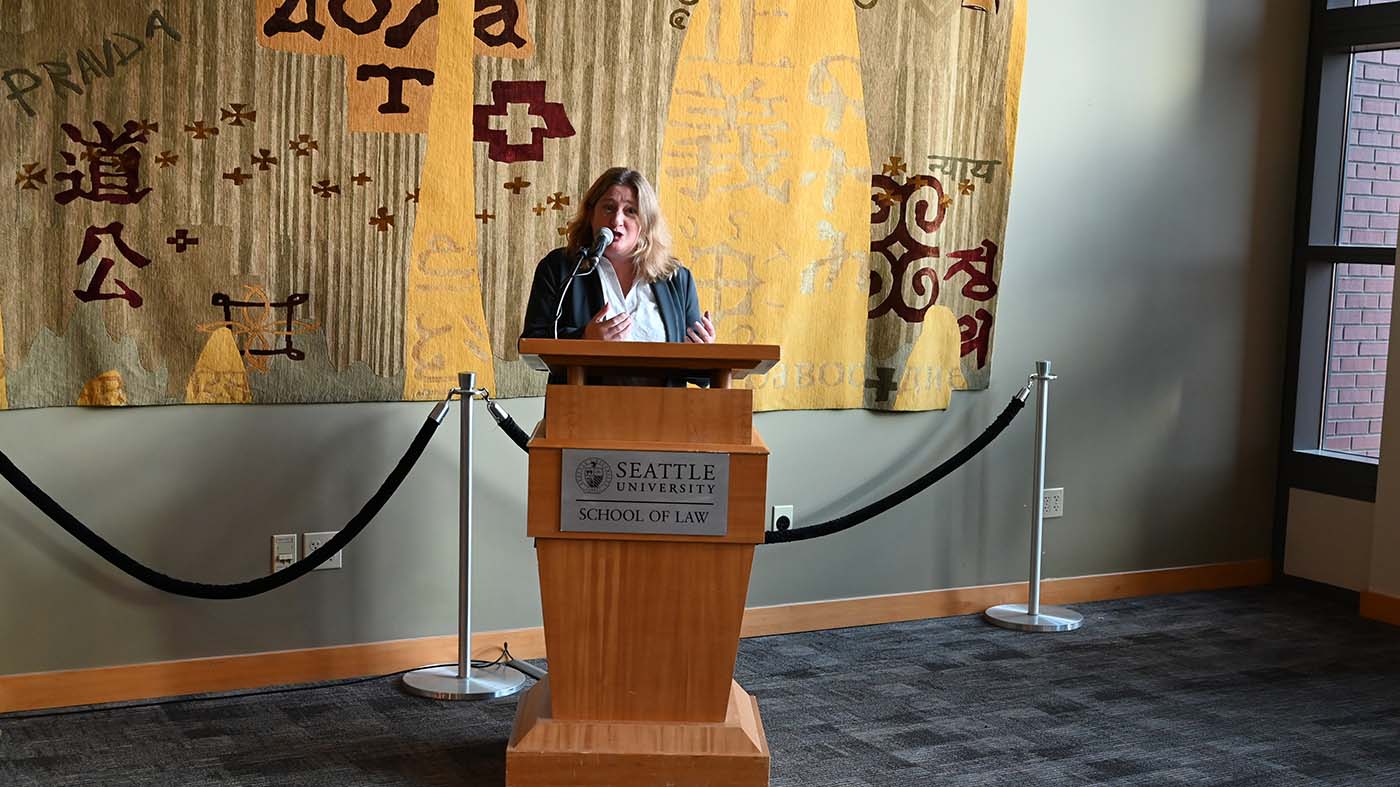The Seattle University School of Law Technology, Innovation Law, and Ethics (TILE) Program’s Annual Celebration of Alumni featured an internationally prominent thought leader, Gaia Bernstein, who spoke about the increasing threat of social media overuse and abuse to youth in the modern era.
The event brought together faculty, alumni, students, and staff who are instrumental in the TILE Program, which allows students pursuing a JD, Master of Legal Studies (MLS), Master of Laws (LLM), and Doctor of Juridical Science (SJD) degrees to learn about the legal disciplines and ethical principles needed for a career in technology-related areas of law. The celebration also saw University of Pennsylvania Carey School of Law Professor Miguel Willis ’17, the Innovator in Residence at the Future of the Profession Initiative, bestowed with the 2024 TILE Alumni Award for being an integral contributor to the program at his alma mater.
In his opening remarks, Dean Anthony E. Varona stated that the TILE Program brings to light “some of the most vexing challenges we face as a society.”
“TILE positions students at the forefront of those challenges and in conversation around those vexing problems,” he said. “With a focus on ethics, social justice, and the practice of law in the tech sector, we prepare graduates not just to navigate, but to lead as leaders serving justice, in the rapidly evolving world of technology.”
Professor Gaia Bernstein is co-director of both the Institute for Privacy Protection and the Gibbons Institute for Law, Science, and Technology at Seton Hall University School of Law in New Jersey. She is also the author of “Unwired: Gaining Control over Addictive Technologies” and recently delivered a TEDx Talk about this topic.
“Like many of us in this room, she is a parent of kids who grew up with screens,” said Professor Margaret Chon, co-director of the TILE Program, in her introduction of Bernstein. “And as she documents in her book, the social media that currently surrounds kids amounts to a huge, uncontrolled, and unregulated experiment on all of our brains, particularly on the developing brains of young children.”
She concluded that Bernstein was “a perfect speaker for this signature event of our TILE program, which is not just about technology law, as important as that is, but also about building a better future for all of us through ethical applications and uses of technology.”
Bernstein began her talk by referencing a seismic moment that occurred in 2009, when smartphones and Facebook started to become increasingly ubiquitous.
In just a few years, Bernstein noticed that children were now looking at their phones instead of playing with each other. That inspired her to begin speaking out about the dangerous consequences of social media addiction.
“It became very clear what was happening,” she said. “The time we were spending online was not an accident. It was happening because tech companies wanted to keep us there. They created designs that manipulated our deepest human vulnerabilities.”
Those designs include features such as the ‘endless scroll’ on Facebook and Instagram and the autoplay of videos on YouTube, Netflix, and TikTok. Even more alarming, social media sites include algorithms that lead people down harmful internet ‘rabbit holes’ — such as showing dieting information to young girls.
Bernstein said that evidence already indicates that this technology causes profound harms. Since 2010, she said, rates of depression among children have doubled, and suicide rates among girls ages 10 to 14 have quadrupled. Studies have pointed to excessive screen time as a cause, especially among girls, noting that time spent online can increase the risk of cyberbullying, cause sleep deprivation, limit in-person social interaction, and create unhealthy body comparisons.
The solution, Bernstein said, is to regulate this technology.
“We protect kids all the time — they can’t buy cigarettes, they can’t buy alcohol, they can’t drive. But when it comes to technology, they can’t be protected,” Bernstein said. “We know that there’s a problem, we know what the costs are, and we also know who’s responsible.”
She compared this with the decades-long battle against Big Tobacco, observing that there “is no magic solution, and there is no one Supreme Court case that is going to solve this.” However, there has been progress. Smartphone bans in schools are becoming more common, and lawsuits have been brought by state attorneys general against social media sites seeking stricter laws, such as mandatory warnings on websites.
Bernstein was especially disturbed when one of her students told her, “But Professor, our generation just prefers not to talk to each other.”
“We have a duty to help this generation,” she said. “Many of us remember a different past, a different childhood, where people connected with each other differently. The longer we wait, the harder it becomes, and the fewer people remember how it is to live differently. This is an opportune moment for change, and it’s important to act before it’s too late.”

